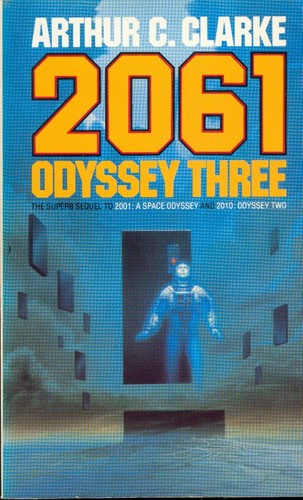Conbini reviewed 2061: Odyssey Three by Arthur C. Clarke (Odyssey #3)
Review of '2061' on 'Goodreads'
3 stars
third book in Clarke's Odyssey-Saga...
short plot description: set (obviously) 51 years after the events in "2010: Odyssey Two" we meet again Dr. Heywood Floyd, now 103 years old. Mankind has build bases on the moon and Ganymede (where a scientist makes an astonishing discovery about Europa) and advances in science have made interplanetary space travel economical feasible, which paved the way for private enterprises. One of them is Tsung Spacelines where Chris Floyd, grandson of Heywood Floyd, works on one of their space ships (named "Galaxy"). Tsung Spacelines has finished building another ship (named "Universe") and invited several celebrities, among them Heywood Floyd, to the maiden flight which includes a stop-over at Halley's comet. But things take a turn for the worse when the Galaxy is hijacked and crash-lands on Europa...
my thoughts: I felt a bit disappointed since the story dealt only marginally with the mystery of the Black Monoliths and their builders and the overall story-arc doesn't get advanced that much.
That out of the way we get some typical Clarke: enthusiastic and optimistic about space exploration, the science as always accurate. The characters are more varied than usual, instead only a crew of capable scientients and officers we get some colourful civilians on a pleasure cruise thrown into the mix.
But all that (including the plot sometimes) takes a backseat to Clarke's imaginative descriptions of some places in our solar system: Ganymede, Europa, Halley's comet and some developing lifeforms are brought vividly to life.
Add some funny musings about the problems on the more mundane aspects of future space travel (e.g. you can get an insurance policy from Lloyds but is hijacking covered?) and you have a good and actual believable book on the exploration of space.
my advice: can be read stand-alone (Clarke dedicates a couple of pages at the beginning of the book to get the reader up to speed) but it's better to start with "2001"

